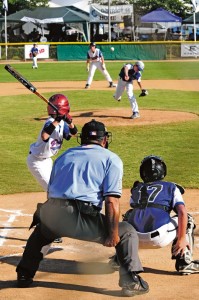by Airman 1st Class Nate Gettleman
86th Airlift Wing Public Affairs

Umpire John Valverde, 86th Communications Squadron plans and resources deputy flight director, positions himself to make a call. In August, Valverde will be traveling to Taylor, Mich., to umpire the Junior League World Series, with boys ranging from 13 to 14 years old.
For those still young enough to dream, it means waking up early on a Saturday morning, stepping onto a dew-soaked field and dreaming of the day the announcer calls their name. The stadium erupts as they step into the batter’s box for their major league debut.
For those of us who have outgrown our playing days, all we have left is obsessively tracking the off-season moves of our favorite franchises, staying up late to watch games back in the states and over analyzing the statisticians attempts to quantify a game that is pure magic. But for the boldest, and strongest of character, it’s getting back into umpiring.
Now that you have a mental image so vivid that you can practically taste sunflower seeds, let’s meet two Ramstein Airmen courageous enough to volunteer to be the most hated man on the field, and not even get paid for it! They’re so good at what they do, they have been selected to umpire the Little League World Series.
John Valverde, 86th Communications Squadron plans and resources deputy flight director, is a fixture at KMC youth baseball and softball games.
“For me it started out of the love of the game. I played baseball and I realized how much I missed it,” said the California native. “I knew I didn’t have the patience to coach, but I learned I had the mentality to umpire.”
Valverde is known as the resident “rules guru” by players and coaches around the league. People will talk to him before and after games about hypothetical scenarios and how he would call that particular play. After a conversation on rules and after a few nasty curveballs, no one will dispute the assertion that Valverde is virtually un-stumpable. Valverde said it’s important to explain the calls he makes to the players and coaches. He said youth baseball is less about competition and more about learning the game.
“If you stay in a league long enough, you see little Johnnys grow up to be great players and great people,” Valverde said.
In August, Valverde will be traveling to Taylor, Mich., to umpire the Junior League World Series, with boys ranging from 13 to 14 years old.
Senior Master Sgt. Jeffrey Bise, 1st Combat Communications Squadron first sergeant, began umpiring out of pure necessity. While stationed at Joint Base Andrews, Md., Bise showed up to one of his son’s little league games with the intent of being a spectator. When there were no umpires to call the game, Bise donned a set of old catcher’s gear, got behind the plate and never looked back.
“Umpiring is a family sport as well. My dad (Lowell Bise) is coming over to Europe to umpire with John (Valverde) and me,” Bise said.
The three umpires will be on the field together in Poland for the junior European tournament.
“My son (Jarrod Bise) will also be keeping score. There will be three generations of the Bise family in Poland this summer,” Bise said. “You have kids who have their idols, but I can honestly say I never had a sports idol. My father’s been my idol and I look up to him. It’s an honor to be on the field with him.”
Bise will be traveling to Eastly, S.C., in July to umpire the Big League World Series, with boys ranging from 16 to 17 years old.
Getting selected to umpire a Little League World Series is no small feat. A maximum of 16 umpires can be selected for each age group’s world series. A minimum of one umpire is selected from each region of the world that sends a team to compete.
Accepting payment for umpiring during the regular season automatically disqualifies an umpire from the post season, and a person can only be selected to work a particular age group’s world series once.
After Valverde and Bise umpire their respective tournaments, they can still umpire in the Little League World Series, but never again for the same age group. However, being in Europe can improve an umpire’s chances of being selected due to the relatively small amount of umpires applying to go.
“My father umpired about 33 years before getting a world series,” Bise said.
Most recently, Bise’s father umpired the 2011 Softball Junior League World Series, with girls ranging from 13 to 14 years old in Kirkland, Wash.
But being an umpire isn’t all sunshine and rainbows.
“It’s the fan’s God-given right to yell at you,” Valverde said. “Most of the time, you just have to brush it off. You’re going to find out in a hurry if you’re cut out for this.”
So here’s to the men who call it how they see it. The men who keep us honest. The men who are willing to sacrifice their popularity to preserve the integrity of the game they love. Love them or hate them, the game wouldn’t be possible without the men we affectionately refer to as “Blue.”


